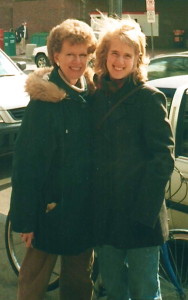A writing mentor once told me, “To be a writer [of memoir] is to be a very good detective.” Like a detective, the memoir writer finds the tension points, the contradictions, and the core story.
After my mother died in 2011, I began working on a memoir about overcoming family trauma. When my mother, a writer and copy editor, was alive, my inquiry into the truth conflicted with her need to protect herself from the past. Tension built between us and tore apart our relationship.
My mother’s widowed friend Karen offered to help me clean out my mother’s belongings to prepare her condo for sale. When she walked into my mother’s bedroom, her eyes landed on my mother’s desk, the top of which I’d already cleared. She bent down to the floor and pointed underneath.
“That needs to be cleaned up,” she said, the blood flowing to her head, reddening her face.
I didn’t know what Karen saw. I thought I’d already removed the important things. I leaned over. “There’s nothing valuable left,” I told her.
But Karen was reaching deep under my mother’s desk as if to begin an excavation. I got down beside her and saw, like a lost treasure, a shelf overflowing with loose folders and spiral notebooks.
Stretching my arm beneath the desk, I wrapped my fingers around a couple of notebooks and pulled them towards me, quickly flipping through pages of my mother’s writing from the 1980s, drafts of poetry and prose she crafted when she was my current age.
“Are these important?” Karen pushed a few folders at me. Before I could answer she handed me more: “What are these?” She placed folder after folder in my hands. “And these?” I saw an overstuffed folder from my college freshman orientation: labeled with the phrase “New Beginnings.” Inside were several envelopes with my younger handwriting on them.
 The idea sunk in: my mother had held onto my letters.
The idea sunk in: my mother had held onto my letters.
I noticed a sliver of newsprint poking out of another thick manila folder, a headline with the word “abuse.” My body grew hot.
Inside were articles on child sexual abuse, highlighted and underlined in many places by my mother, as if she were conducting an investigation. There were loose legal pad pages full of her handwriting outlining facts from books about the mother’s role in father-daughter incest, the perpetrator’s personality, denial, family system theory, the adult child coping with PTSD, and the path to heal from trauma.
I could hardly believe it. I’d asked my mother many times to talk openly about what had happened in our family, about how it affected me, us, but she’d refused.
After her death, I rediscovered the truth: in private, my mother had gone to great lengths to grapple with the past. She was unable to speak of such darkness aloud, but she left behind her organized collection of facts and thoughts and feelings for me to find.
Across a great divide, my mother and I reconciled, working as a writer-detective team. Together, we wrapped our minds and hearts around the whole terrible story, articulating the truth, one word at a time.
-Tracy Strauss, Fellow in Nonfiction

